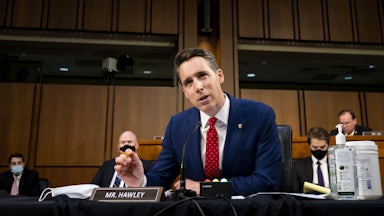In the last 24 hours, about the only publication that has not offered a breathless account of Liz Cheney’s plight is Epicurious. And that may only be because the newly anti-carnivore recipe site is deliberately resisting a story that offers so much red meat to political reporters.
The Cheney saga—which has been elevated in the press clips from a mere story—has all the dramatic elements that journalists crave. There’s an imperiled, yet combative, leading character with a famous name; a fight that is heavy on symbolism and short on substance; and a slowly arriving moment of reckoning that will produce hundreds more Cheney stories before House members return to Washington next week.
If you somehow missed the story line (and I do hope that you enjoyed your meditation retreat), Cheney is about to be ousted from her position in the House Republican leadership because of her stalwart opposition to the Cult of Donald Trump.
Despite her long history as a hardline conservative and her role as the daughter of Dick Cheney, the Darth Vader of the Iraq War, she discovered an inner resolve of principle after the January 6 insurrection. Cheney voted to impeach Trump, and she continues to attack the defrocked president for “seeking to unravel critical elements of our constitutional structure that make democracy work—confidence in the result of elections and the rule of law.”
That is enough for the media to treat Cheney’s struggles as the biggest Capitol Hill news story since the Senate censured Joe McCarthy in 1954. The Wall Street Journal has called Cheney’s battle with House GOP leader Kevin McCarthy “an extraordinary rift.” The New York Times went with “open Republican warfare.” A Washington Post editor couldn’t resist headlining an op-ed about Cheney in her home state of Wyoming as a (you guessed it) “battle for the soul of the Republican Party.” Politico began its Thursday morning “Playbook” newsletter by calling Cheney’s all-but-certain firing “one of those historical hinge moments.” And the BBC (yes, the British Broadcasting Corporation) offered up its roster of “the winners and losers of this latest party purge.”
So what if an overwhelming number of American voters wouldn’t recognize an uncaptioned picture of Liz Cheney on their TV screens? So what if almost no one (aside from those who work on Capitol Hill) knows what the chair of the House Republican caucus does? Or cares who holds this normally anonymous GOP leadership position? What matters to reporters and pundits is—to steal a dramatic line from Sherlock Holmes—the game is afoot.
But is it really?
Yes, the Republicans will face their inevitable day of reckoning over their fealty to Trump. But we already know that the House Republicans are a hanging jury since 139 of them voted on January 6 to try to overturn Joe Biden’s election. Liz Cheney would have about as much of a chance of holding onto her seat if paid-up members of Mar-a-Lago decided her fate.
The upcoming vote on Cheney has been likened to the loud booing last Saturday of Trump critic and 2012 Republican presidential nominee Mitt Romney at the Utah GOP convention. The reaction from maybe half the 2,000 delegates in Salt Lake City made for arresting television, but it is hard to find a deeper moral since bright-red Utah is not exactly a swing state. And a convention vote to censure Romney for disloyalty to Trump was rejected 798 to 711.
What complicates everything is that recent poll numbers about how Republican voters view Trump’s role in the party are murky. On one hand, an NBC News poll found that a bare majority of GOP voters (50 percent) consider themselves more loyal to the party than to Trump (44 percent). On the other, in late April, a CNN poll discovered that a stunning 70 percent of Republicans believe that “Biden did not legitimately win enough votes to win the presidency.”
But, unlike the House Republican caucus, most GOP voters do not appear eager to purge public officials who refuse to bow before the Great God Trump. In early March, before Cheney dominated the political news, another CNN poll found that only 20 percent of Republicans believed in penalizing “elected officials who have expressed opposition to Donald Trump.” A Pew Research Center survey taken at roughly the same time similarly revealed that 43 percent of GOP voters were “accepting” of those who “openly criticize Donald Trump.”
These poll results can be massaged to fit almost any predetermined conclusion about Trump and the GOP. The uncritical Republican acceptance of Trump’s Big Lie about a stolen election is deeply troubling. But a Soviet-style purge of Trump dissenters seems more popular on Capitol Hill and at state party conventions filled with activists than it is among the general Republican electorate.
All this leads to the conclusion that the proxy war in Washington over Liz Cheney is being overhyped and over-covered as a national referendum on Trump. Only after the 2022 congressional primaries are over will we have a clear-eyed sense of whether the Republicans are heading into a post-Trump future or whether they are destined to be the political equivalent of White Russians in the Paris of the 1920s, forever dreaming of a Czarist restoration.
Of course, the House Republicans led by Mar-a-Lago supplicant Kevin McCarthy are devoid of principle. But we knew that the moment that most GOP House members stuck with their vicious rejection of Biden’s election as Trumpian storm troopers occupied the Capitol. Maybe the real news story on Capitol Hill is that it has taken Liz Cheney this long to realize how morally repugnant most of her GOP congressional colleagues have become.








